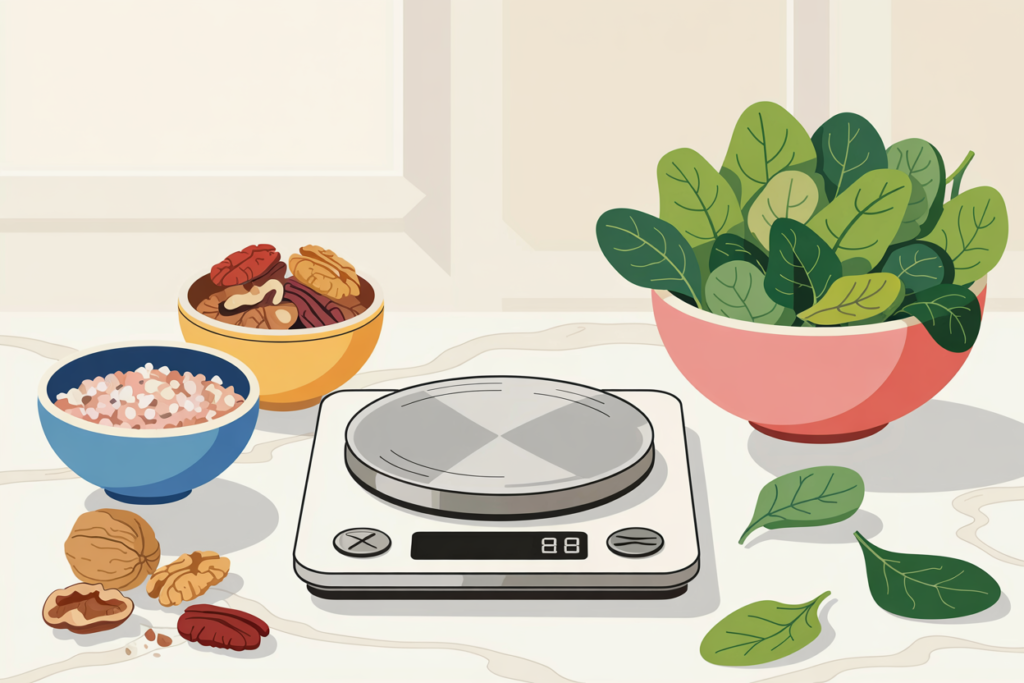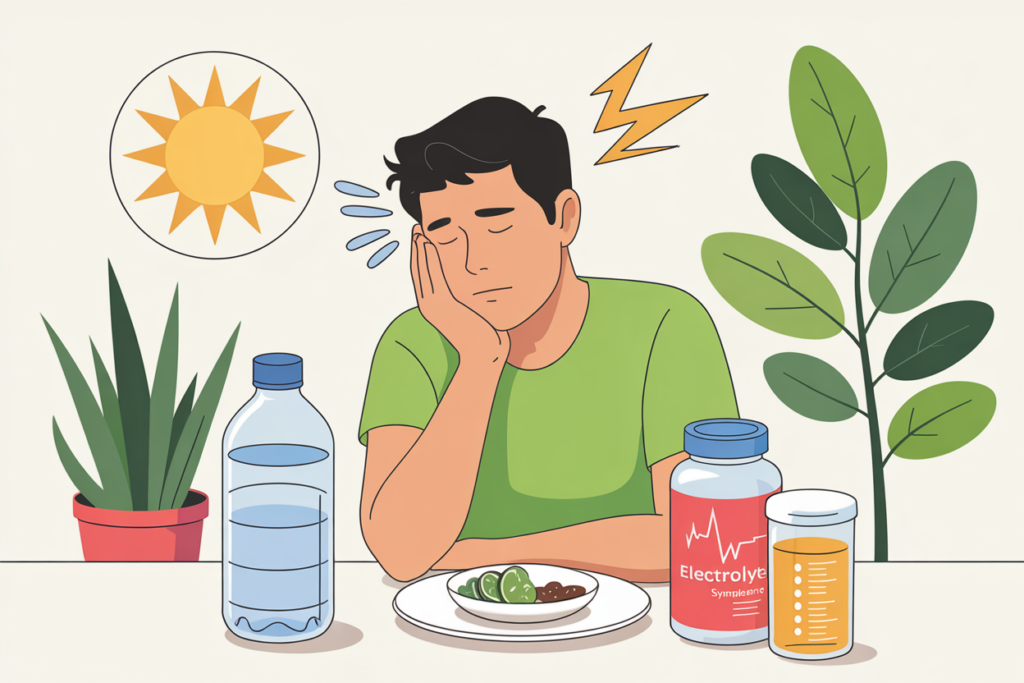Most people start intermittent fasting with a single question: How do I lose weight and feel better? That’s a solid place to start. But beneath the buzz about fat-burning and metabolic resets, there’s something quieter happening in your body.
It’s called electrolyte balance, and it matters more than you might think.
If you’ve ever tried fasting and hit a wall of fatigue, headaches, or muscle cramps, chances are your electrolyte levels were off. Your body runs on these tiny minerals. Without them, even the best fasting plan can make you feel worse instead of better.
So, if you’re easing into a 16:8 rhythm or pushing into longer fasts, understanding electrolytes helps you fast smarter. It’s about supporting your body while it does the hard work. The Fasting App can help, too. You can track hydration, symptoms, and energy patterns so you’re not guessing what your body is trying to tell you.
So, What Are Electrolytes?
You’ve probably heard the word tossed around, especially in workout circles or on sports drink labels. But what exactly are electrolytes?
In short, they’re minerals that carry an electric charge. Your body needs them to keep things running smoothly:
- Your muscles rely on them to contract and relax.
- Your nerves use them to send signals.
- Your cells need them to regulate fluids and pH balance.
- And your blood pressure? Yep, electrolytes help control that too.
The main players include sodium, potassium, magnesium, calcium, phosphorus, and chloride. And here’s the kicker: even mild deficiencies can throw things off. Tired muscles, brain fog, low energy…these aren’t just fasting side effects. Sometimes, they’re your body’s SOS for electrolytes.
A 2023 review explained how foundational these minerals are to muscle, heart, and brain health. Yet, they’re easy to overlook when you’re focused on your fasting window and calorie counts.
Why Fasting Depletes Electrolytes—And What It Does to You
If you’ve ever started a fasting routine and noticed the scale dropping quickly in the first couple of days, you’re not imagining it. But here’s the thing: it’s not all fat that you’re losing. A lot of that early drop is water weight, and there’s a biological reason for it.
When you stop eating for an extended period, your insulin levels start to fall. That’s a good thing for fat burning, but it also triggers a process called natriuresis: a fancy term for when your kidneys start flushing out sodium and water. As sodium exits your body, water tags along for the ride.
Unfortunately, that isn’t the end of the story. Potassium and magnesium tend to follow, leaving you depleted of the minerals that keep your muscles firing and your energy steady.
This is why some people feel tired, dizzy, or cranky just a day or two into fasting. Even if you’re doing time-restricted eating like 16:8, these shifts can creep in if your diet isn’t giving you enough of these minerals. The longer you fast—24 hours, 36 hours, or more—the more likely you’ll notice it.
Signs You Might Be Electrolyte Deficient While Fasting
Your body has a way of getting your attention when things are off balance, and electrolyte deficiency is no exception. If you’re fasting and start feeling any of these symptoms, it’s time to pay attention:
- Headaches that won’t quit
- Feeling dizzy or lightheaded, especially when standing up
- Muscle cramps or spasms out of nowhere
- Heart palpitations or fluttery feelings in your chest
- A general sense of fatigue or low energy
- That frustrating brain fog that makes it hard to focus
- Constipation
- An irregular heartbeat in more severe cases
Think of these as your body waving a little red flag: it’s not punishing you for fasting, but it is asking for support.
The Unique Role of Each Electrolyte During Fasting

Sodium: Your Blood Pressure’s Best Friend
Sodium often gets a bad rap in general nutrition advice, but when you’re fasting, it’s your best friend. This mineral helps regulate your blood volume and keeps your blood pressure stable. When sodium gets too low, that’s when the notorious “keto flu” symptoms kick in: headaches, fatigue, irritability, and that sluggish, can’t-get-off-the-couch feeling.
If this sounds familiar, try adding some salt to your water or using an electrolyte drink designed for fasting.
Potassium: The Key to a Healthy Heart
Potassium is another key player, especially when it comes to your heart. It helps control nerve function and muscle contractions, and your heart is, after all, a muscle. Low potassium levels can set you up for arrhythmias, or irregular heartbeats, which is not something you want to mess around with.
If you notice that your muscles feel weak or your heartbeat feels off, potassium could be the missing piece.
Magnesium: Your Body’s Convenient Multitool
Magnesium is like the multitool of the mineral world. It’s involved in over 300 biochemical processes, including energy production and nerve function. Yet it’s easy to run low on magnesium, especially if your baseline intake wasn’t great to begin with.
You can usually tell if you’re low on magnesium if you get cramps that wake you up at night, restless sleep, irritability, or that nagging sense of tension in your body. There’s a good chance that’s a magnesium deficiency talking. Studies even link low magnesium to disrupted sleep and metabolic hiccups, both of which can derail your fasting experience if you’re not careful.
Calcium: A Source of Muscle and Nerve Support
Finally, there’s calcium. Most people think of it in terms of bone health, but it’s just as critical for muscle function and nerve transmission. Calcium doesn’t tend to deplete as quickly during fasting compared to sodium or potassium, but that doesn’t mean it’s unimportant.
If you’re practicing intermittent fasting alongside a restrictive diet that limits dairy or calcium-rich foods, it’s worth paying attention to this mineral too.
Can You Drink Electrolytes While Fasting?
Absolutely! And in many cases, you should. Fasting naturally flushes water and minerals from your system, so replacing electrolytes helps prevent the common side effects like fatigue, muscle cramps, and brain fog.
The trick is to choose electrolytes that won’t break your fast. That means looking for sugar-free, calorie-free options with essentials like sodium, potassium, magnesium, and trace minerals such as zinc and phosphorus.

If you prefer something homemade, it’s easy: mix water with a pinch of sea salt, a dash of potassium salt, and a few drops of liquid magnesium. It’s simple, clean, and effective.
For rehydration after breaking your fast, bone broth is another excellent option. It’s packed with sodium, potassium, and calcium, along with amino acids to support recovery. Just save it for your eating window since it contains calories.
If you need help tracking what your body’s asking for, the Fasting App makes it easier to monitor hydration, symptoms, and electrolyte intake so you can adjust before discomfort hits. Small adjustments can make the difference between a miserable fast and one where you feel focused, clear, and energized.
How to Supplement Electrolytes Safely While Fasting
When it comes to electrolytes, it’s about hitting the right balance. Here’s a quick guide to keep you on track during fasting:
- Sodium: Most people need 2 to 3 grams of sodium per day while fasting. If you’re sweating more due to workouts or warm weather, you might need a little extra.
- Magnesium: Start with 200 to 400 mg per day. Just be careful! Too much magnesium can backfire, causing digestive issues like diarrhea.
- Potassium: Stick to around 1,000 mg per day, unless your doctor suggests otherwise. High doses can be risky, especially for your heart.
- Trace minerals: Don’t forget about the smaller players like zinc and selenium. A good trace mineral supplement can help restore what you lose through sweat and urine.
And if you’re planning to fast for more than 48 hours—or if you have any kidney concerns—it’s always a good idea to check with your healthcare provider first.
Practical Tips for Electrolyte Management During Fasting
Staying on top of your electrolytes during fasting doesn’t have to be complicated. A few simple habits can help keep your energy up and your body running smoothly.
First, hydrate with intention. It’s tempting to just sip water all day while fasting, but too much plain water can actually flush minerals out of your system. Pair your water with electrolytes to keep things balanced.
Next, try salting your water lightly, especially in the morning or after a workout. This small addition can help replenish sodium levels and prevent that lightheaded, foggy feeling that sometimes creeps in during fasting.
It also helps to pay attention to your body’s signals. The Fasting App makes it easy to log hydration, mood, and energy. Tracking this stuff can help you catch imbalances before they turn into headaches or cramps.
When you do break your fast, opt for nutrient-dense foods. Think avocados, leafy greens, nuts, and seeds. These foods naturally restore potassium and magnesium. And don’t forget to adjust based on your environment: if it’s hot or you’re hitting the gym, you’ll lose more minerals through sweat and may need to supplement accordingly.
Electrolytes Are the Missing Link in Successful Fasting
Fasting is about supporting your body while it repairs, resets, and recharges. Electrolytes are what keep your mind clear, your energy steady, and your fast sustainable.Whether you’re sticking with time-restricted eating, alternate-day fasting, or going for an extended fast, managing electrolytes can help you thrive instead of barely make it. And with the Fasting App by Municorn, you don’t have to guess. You can track hydration, monitor symptoms, and adjust as needed, so you can feel your best every step of the way.




